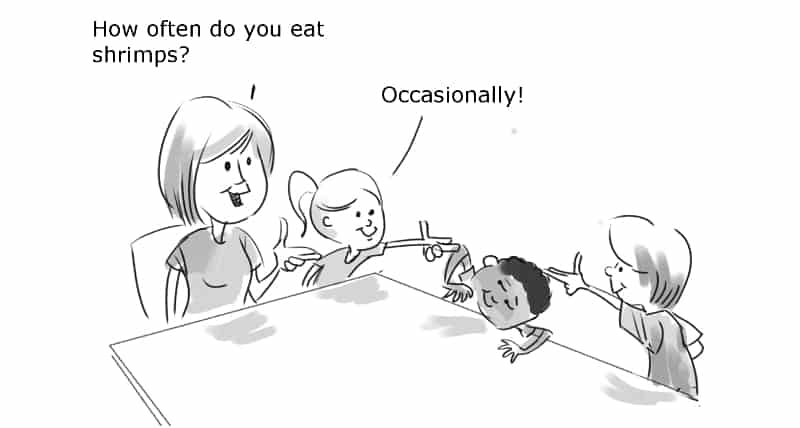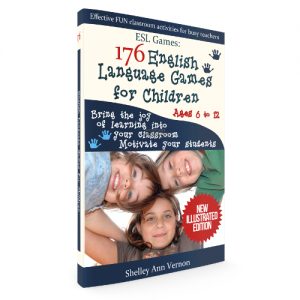Learn how to teach adverbs of frequency with fun games here! This post has some fun ESL games for teaching adverbs of frequency to primary school children. All the games are taken from 176 English Language Games for Children.
1. How to teach adverbs of frequency – presentation
Use examples that relate to your students. For instance, introduce adverbs of frequency associated with hobbies, sports, and activities that your pupils like. Put the following adverbs on the board; however, with lower levels or younger children, use less:
Always, usually, often, sometimes, occasionally, hardly ever, and never.
Start with a listening activity
Say, “I hardly ever dance.” Those students who rarely dance make a thumbs down gesture and repeat the phrase together. Say, “I usually play sport at school on Wednesday.” The students who play sports on Wednesday make a thumbs-up sign and repeat your sentence. Continue making up sentences along these lines, making sure your topics are relevant to your class. More examples are: I always listen to music in my room; I occasionally chat with my friends late at night when I should be asleep; My brother often does his homework after school. I never cook dinner for my family; My sister hardly ever makes her bed in the morning. I always put ketchup on my chips. And so on.
Brainstorm
Ask questions such as “How often do you play football,” the teams call out the answers. Award points for any correct adverb. It does not matter if some in the team say never and others say often – the main thing is that they are using the adverbs.
True or false
A pupil from one team says, “I often make chocolate cake” – the other team decide if it is true or false. To prevent cheating, the pupil claiming to make chocolate cake has to put a tick or a cross on a piece of paper so they can’t fib if the other team guess correctly! Next, pupils write three sentences using frequency adverbs – two true and one false. Then, they read them out, and the others guess which is the incorrect sentence. If you have a big class, work in pairs, but do a couple of demos first, so everyone knows what to do.
2. How to teach adverbs of frequency – practise
Almost any game from 176 English Language Games for Children will do to drill any grammar! For example, here’s the game BANG, adapted to adverbs of frequency.
Students form a circle with the teacher in the middle. The teacher fires a question at a student, pretending to shoot them with a ‘happy bullet.’ The teacher’s question is, “How often do you eat noodles?” The student who has been ‘shot’ ducks and the children on either side race to shoot each other with their answer, using the adverb of frequency that corresponds to them, like “Often!” or “Never!” The fastest student with correct English wins, and the other person is out.
Miscellaneous comment: While the Vietnamese playground children did genuinely pretend to shoot each other, a savvy teacher suggested shooting happy bullets as a way to make the game more socially correct!
If your class is small, then continue until only two students are left. These two then take four steps away from each other. Then, the teacher calls out the question, and the two students turn round and shoot at each other with the answer.
Request silence aside from the words used in the game. Eliminate noisy students. Tell them to read the workbook in the meantime.
3. Consolidate with a reading and writing task
Now is the time to open your textbook and have students race to count all the adverbs of frequency in the unit. Otherwise, have students create fill in the blanks sentences for the class to complete, or try this writing race.
I hope this blog post helped. Your comments and questions are welcome. If you are stuck for an idea on how to teach a grammar point, just ask!
Get the book in download or paperback.
All the best
Kind regards
Shelley Ann Vernon
-
Games
ESL Games book for primary & middle school children
Rated 5.00 out of 5€19.97Original price was: €19.97.€15.33Current price is: €15.33. Add to cart


5 thoughts on “How to teach adverbs of frequency”
Loved it.
Excellent ideas. I’ll try them in class.
Thanks.
Very clever idea, thank you; I’m going to use it in class.
I find the image very disturbing.
Hello, Thanks for your comment. I know, it’s from a Vietnamese playground game, and we know their history, poor things. However, you can pretend to fire love or blessings at each other. The fingers can be magic wands. You can definitely adapt this to something that you feel beneficial and enjoyable. It’s a fun game, so turn the meaning into something great.
All the best
Shelley